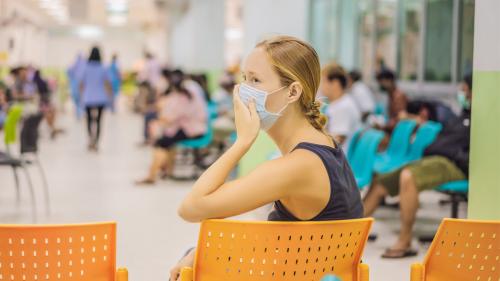
-
Understanding primary immunodeficiency (PI)

Understanding PI
The more you understand about primary immunodeficiency (PI), the better you can live with the disease or support others in your life with PI. Learn more about PI, including the various diagnoses and treatment options.
-
Living with PI
-
Addressing mental health
-
Explaining your diagnosis
- General care
- Get support
- For parents and guardians
-
Managing workplace issues
- Navigating insurance
-
Traveling safely

Living with PI
Living with primary immunodeficiency (PI) can be challenging, but you’re not alone—many people with PI lead full and active lives. With the right support and resources, you can, too.
-
Addressing mental health
-
Get involved

Get involved
Be a hero for those with PI. Change lives by promoting primary immunodeficiency (PI) awareness and taking action in your community through advocacy, donating, volunteering, or fundraising.
-
Advancing research and clinical care
-
Research Grant Program
-
Consulting immunologist
-
Diagnosing PI
-
Getting prior authorization
-
Clinician education
-
Survey research
-
Participating in clinical trials

Advancing research and clinical care
Whether you’re a clinician, researcher, or an individual with primary immunodeficiency (PI), IDF has resources to help you advance the field. Get details on surveys, grants, and clinical trials.
-
Research Grant Program
While the pandemic has prompted some changes in how babies with SCID are cared for within the hospital setting, it hasn’t affected the timing of treatments for the babies at one of the top-ranked pediatric bone marrow transplant centers.
Dr. Blachy J. Dávila Saldaña, director of the Combined Immunodeficiency BMT Clinic at Children’s National Hospital and assistant professor of pediatrics at George Washington University School of Medicine and Health Services, said that the hospital chose to delay some elective, less urgent transplants, but not transplants for SCID.
“That’s not possible with SCID because of the very high risk of infection, and we know the longer patients go without transplant, the more likely it is that they’re going to have an infection and that definitely decreases our chances of the transplant going great,” he said. “So, we shifted our gears on continuing to do transplants, but as safely as possible.”
Dr. Dávila spoke during a recent SCID Compass Lunch & Learn, “Navigating HSCT During COVID-19 and Beyond.” During the presentation, Dr. Dávila described the steps the hospital has taken to adapt during a pandemic.
Most importantly, Children’s National has greatly increased measures to control infection and protect patients with SCID, as well as others in the bone marrow transplant unit.
At the top of the list of those measures is isolation. SCID patients are cared for in a locked transplant unit which can only be accessed by those who have a key card. In addition, providers entering the room of a SCID patient must wear a mask, gloves, and gown, requirements that were in place even before COVID-19.
Now that wearing protective equipment has become universal and is encouraged by the CDC in all medical settings because of the pandemic, the rate of infection in patients has decreased, said Dr. Dávila.
“We’ve seen very little to no infection in our patients with SCID ever since the universal masking guideline came into place,” he said.
Other measures of protection that providers must take include:
- Mandatory vaccination for all who work in the hospital
- Mask at all times, even when not in clinical interactions
- Eye protection with clinical interactions
- Remote working when not clinically required
Dr. Dávila also discussed how the hospital has worked with families on steps they can take to protect their children with SCID.
- Vaccinations are encouraged for all SCID caregivers.
- Only two caregivers at a time are allowed in the room.
- Visitors who aren’t caregivers require authorization to be allowed into the bone marrow transplant unit.
- No one under the age of 12 is allowed in the transplant unit because of the increased risk of asymptomatic respiratory infections that can be transmitted.
Another area where the hospital has altered procedures to reduce infection is in the stem cell donation process for unrelated donors.
Before COVID-19, donors visited a hospital for bloodwork to ensure they were healthy enough to donate and ensure that the blood was healthy. Then the donor would return a month later and provide blood, which was transferred to the patient within 24 to 48 hours.
“We changed that a little bit because 30 days is a lot of time particularly in the realm of COVID and we did see donors that were clear but eventually got infected, particularly when we’re dealing with unrelated donors,” said Dr. Dávila.
Now when donors visit a hospital and provide their blood, the blood is screened, and if the blood is healthy, it’s frozen immediately until use.
“That way we can ensure that the donor remains healthy until giving that product and then we can start conditioning being absolutely sure that we are going to get a product,” said Dr. Dávila Saldaña.
Children’s Hospital is also addressing the emotional needs of families during the pandemic. The hospital created a multidisciplinary team from the areas of social work, psychology, and palliative care to meet with families of children diagnosed with SCID.
“It’s very anxiety provoking to think that you have a child who has no immunity in the middle of an epidemic,” said Dr. Dávila.
To listen to the entire presentation, click here.
Related resources
Sign up for updates from IDF
Receive news and helpful resources to your cell phone or inbox. You can change or cancel your subscription at any time.





The Immune Deficiency Foundation improves the diagnosis, treatment, and quality of life for every person affected by primary immunodeficiency.
We foster a community that is connected, engaged, and empowered through advocacy, education, and research.
Combined Charity Campaign | CFC# 66309




